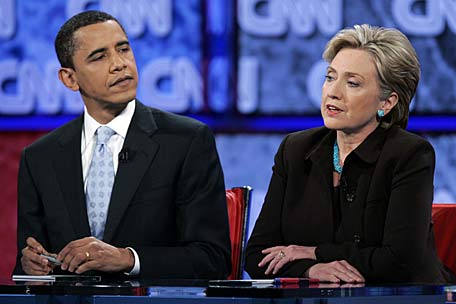Super Tuesday: Clinton, Obama evenly placed, McCain emerges Republican frontrunner
 Washington, Feb. 6 : New York Senator Hillary Rodham Clinton and Illinois Senator Barack Obama were evenly matched late on Tuesday night in terms of delegate votes from 22 Primaries and Caucuses for the Democratic presidential nomination, while Republican John McCain emerged as the clear frontrunner for his party's nomination, beating of challengers Mike Huckabee and Mitt Romney.
Washington, Feb. 6 : New York Senator Hillary Rodham Clinton and Illinois Senator Barack Obama were evenly matched late on Tuesday night in terms of delegate votes from 22 Primaries and Caucuses for the Democratic presidential nomination, while Republican John McCain emerged as the clear frontrunner for his party's nomination, beating of challengers Mike Huckabee and Mitt Romney.
Clinton secured California, Massachusetts, New Jersey, New York, Arizona, Arkansas, Oklahoma and Tennessee, while Obama countered by winning in Illinois, Alabama, Alaska, Colorado, Connecticut, Delaware, Georgia, Idaho, Kansas, Minnesota, Missouri, North Dakota and Utah.
The results ensured that the fierce contest for delegates will continue into critical primaries in Texas and Ohio on March 4, and possibly beyond, in what has become the Democratic party's most competitive race in the last 25 years. Only the outcome in New Mexico remained unresolved early this morning.
Clinton appeared before supporters in New York shortly before the polls closed in California, thanking her supporters for voting "not just to make history, but to remake America."
Obama, who was in Chicago, congratulated Clinton on her successes.
Clinton and Obama were fighting not just for state-by-state victories but also for an advantage in the nearly 1,700 delegates up for grabs yesterday.
According to the Washington Post, a ides to both candidates said that, regardless of how the two carved up the states, neither would emerge with enough of an edge to claim a substantial advantage.
Twenty-two states held Democratic contests yesterday, with 1,681 pledged delegates to the party's national convention in Denver at stake. The 22 states account for 52 percent of all pledged delegates awarded during the nomination battle. There will be 4,049 delegates attending the national convention; a candidate needs 2,025 to secure the nomination. Of that total, 3,253 are pledged delegates, which means their votes are determined by the caucus or primary results in their state. The remainder are superdelegates, who are free to vote for whomever they prefer.
McCain captured the biggest Super Tuesday states of New York, New Jersey, Connecticut, California, Missouri, Arizona, Illinois, Oklahoma and Delaware, but failed to knock out his rivals, Huckabee and Romney, who deprived him of victories across GOP strongholds in the South and West.
Republicans went to the polls in 21 states.
Speaking to supporters in Phoenix, McCain said, "We won some of the biggest states in the country. Tonight, I think we must get used to the idea that we are the Republican Party frontrunner for the nomination of president of the United States, and I don't really mind it one bit."
Romney and Huckabee together kept at least 11 states out of McCain's column, and each claimed to be the alternative to the front-runner, who struggled throughout the day to appeal to conservatives.
Beside his home state of Arkansas, Huckabee prevailed in Alabama, Tennessee, Georgia and West Virginia.
Romney won his home state of Massachusetts, Utah, Minnesota, Montana, Colorado, North Dakota and Alaska.
With a little more than half of the delegates allocated after midnight, McCain had collected 420 delegates, compared with 130 for Romney, 99 for Huckabee and 5 for Rep. Ron Paul (Texas). Once delegates from California and other states that had not completely reported are included, Republican strategists expected McCain will easily top
500. He entered yesterday's contests with 102 delegates from previous victories. (ANI)